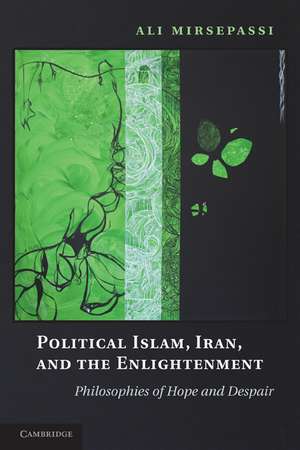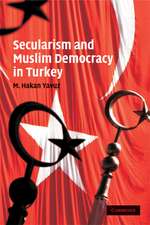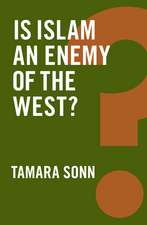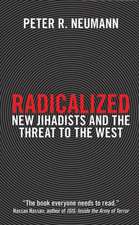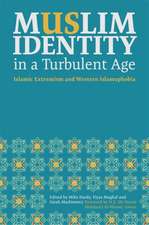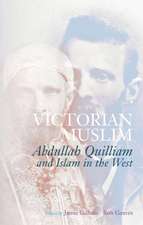Political Islam, Iran, and the Enlightenment: Philosophies of Hope and Despair
Autor Ali Mirsepassien Limba Engleză Paperback – 5 dec 2010
| Toate formatele și edițiile | Preț | Express |
|---|---|---|
| Paperback (1) | 220.42 lei 6-8 săpt. | |
| Cambridge University Press – 5 dec 2010 | 220.42 lei 6-8 săpt. | |
| Hardback (1) | 691.14 lei 6-8 săpt. | |
| Cambridge University Press – 5 dec 2010 | 691.14 lei 6-8 săpt. |
Preț: 220.42 lei
Nou
Puncte Express: 331
Preț estimativ în valută:
42.18€ • 43.88$ • 34.82£
42.18€ • 43.88$ • 34.82£
Carte tipărită la comandă
Livrare economică 15-29 aprilie
Preluare comenzi: 021 569.72.76
Specificații
ISBN-13: 9780521745901
ISBN-10: 052174590X
Pagini: 240
Dimensiuni: 152 x 229 x 13 mm
Greutate: 0.32 kg
Editura: Cambridge University Press
Colecția Cambridge University Press
Locul publicării:New York, United States
ISBN-10: 052174590X
Pagini: 240
Dimensiuni: 152 x 229 x 13 mm
Greutate: 0.32 kg
Editura: Cambridge University Press
Colecția Cambridge University Press
Locul publicării:New York, United States
Cuprins
Introduction: political Islam's romance with the 'West'; 1. Intellectuals and the politics of despair; 2. The crisis of the nativist imagination; 3. Modernity beyond nativism and universalism; 4. Heidegger and Iran: the dark side of being and belonging; 5. Democracy and religion in the thought of John Dewey; 6. Enlightenment and moral politics; 7. Conclusion.
Recenzii
"'This text is an extremely valuable and timely contribution to the debate. Mirsepassi's study shows clearly how the critique of the 'West' appropriated by a series of Islamist writers and thinkers, is itself a product of the Western discourse and by extension an integral part of the Western intellectual tradition. In this sense the philosophers of political Islam are no more 'authentic' in relation to Western discourse than the nationalists they rejected." - Ali M Ansari, Professor of Iranian History, University of St Andrews
“This very rich and complex book shows the cosmopolitanism of world cultures in action. Even after the defeat of the Nazis in 1945, the ideological moves behind Nazism were just coming into their own. Mirsepassi illustrates how the world-picture that calls itself Islamism is actually derived from the Western Counter-Enlightenment. This tradition goes back to the midst of the Enlightenment. It showed immense vitality in the 20th century: it reached a climax after WWI, when Martin Heidegger transformed his early Existentialist insight into Nazi propaganda, and another after WWII when his followers produced an explosive alloy of "Nativist" tradition and radicalism for Iran's Islamic revolution. Mirsepassi shows us how this mix poisoned Iranian life for a generation, but also how Iranian intellectuals may have overcome it at last.” - Marshall Berman, Distinguished Professor of Political Science, The City College of New York
"Ali Mirsepassi has established a reputation as a unique and bold scholar. He brings to Islamic studies a theoretical depth and scope rare among scholars. In Political Islam, Iran, and the Enlightenment, he stakes out an original perspective that highlights the Enlightenment influences on contemporary Islamic thinking and politics. In particular, Mirsepassi provides a skillful analysis of Western cultural traditions and their impact on 20thc Iranian intellectuals. This volume will be of great interest to specialists of Islam and to political theorists." - Steven Seidman, Department of Sociology, State University of New York
“This very rich and complex book shows the cosmopolitanism of world cultures in action. Even after the defeat of the Nazis in 1945, the ideological moves behind Nazism were just coming into their own. Mirsepassi illustrates how the world-picture that calls itself Islamism is actually derived from the Western Counter-Enlightenment. This tradition goes back to the midst of the Enlightenment. It showed immense vitality in the 20th century: it reached a climax after WWI, when Martin Heidegger transformed his early Existentialist insight into Nazi propaganda, and another after WWII when his followers produced an explosive alloy of "Nativist" tradition and radicalism for Iran's Islamic revolution. Mirsepassi shows us how this mix poisoned Iranian life for a generation, but also how Iranian intellectuals may have overcome it at last.” - Marshall Berman, Distinguished Professor of Political Science, The City College of New York
"Ali Mirsepassi has established a reputation as a unique and bold scholar. He brings to Islamic studies a theoretical depth and scope rare among scholars. In Political Islam, Iran, and the Enlightenment, he stakes out an original perspective that highlights the Enlightenment influences on contemporary Islamic thinking and politics. In particular, Mirsepassi provides a skillful analysis of Western cultural traditions and their impact on 20thc Iranian intellectuals. This volume will be of great interest to specialists of Islam and to political theorists." - Steven Seidman, Department of Sociology, State University of New York
Notă biografică
Descriere
This book argues that the discourse of political Islam has strong connections to important, disturbing currents in Western philosophy and intellectual trends.
